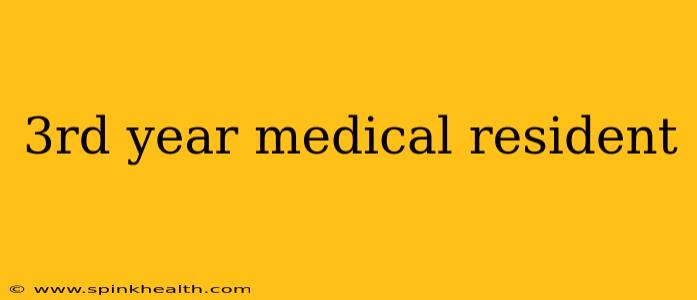The Thrilling and Treacherous Third Year: A Medical Resident's Journey
The air crackles with a nervous energy. It’s the start of my third year as a medical resident, a pivotal point in my training where the theoretical knowledge painstakingly acquired during medical school finally collides with the raw, visceral reality of patient care. Gone are the tentative steps of the first year, the shadowing and cautious observations. This is it – the deep end. And frankly, it's exhilarating and terrifying in equal measure.
My first two years laid the groundwork: the long hours, the relentless learning curve, the endless stream of new information. I learned to read EKGs with a degree of confidence, to interpret X-rays, and to manage a growing array of common ailments. But this third year? This is where the rubber meets the road. This is where I'm entrusted with more responsibility, more autonomy, and more pressure.
What's the biggest challenge of being a 3rd-year medical resident?
The biggest challenge, without a doubt, is the sheer weight of responsibility. I'm no longer just observing; I'm actively managing patients, making critical decisions that directly impact their lives and health. This constant responsibility can be draining, leading to moments of self-doubt and even burnout. The pressure is immense, especially when facing complex cases with uncertain outcomes. Learning to manage this pressure, to trust my instincts while remaining humble and always seeking guidance when needed, is an ongoing process.
What are the key differences between a 3rd-year and 2nd-year resident?
The difference between a second and third year is like the difference between learning to ride a bike with training wheels and riding solo. As a second year, I was still heavily supervised, often having senior residents or attending physicians review my plans and decisions. In my third year, I'm leading the charge, developing my own treatment plans, and presenting them with greater confidence. There's still a strong safety net, of course—my attendings are always available for consultation—but the level of autonomy is significantly higher.
How much time do 3rd-year medical residents typically work?
Let's be frank: the hours are long. Very long. While the exact number varies by specialty and institution, it's not uncommon to work 80 hours a week or more. This relentless workload necessitates excellent time management skills, resilience, and a strong support system. Finding a healthy balance between work and personal life is a constant struggle, one that requires conscious effort and often some painful compromises.
What kind of procedures do 3rd-year medical residents perform?
The procedures a third-year resident performs are heavily dependent on their specialty. A surgical resident might be assisting in major surgeries, perhaps even performing some procedures under supervision. An internal medicine resident might be performing more minor procedures like lumbar punctures or inserting central lines. Regardless of the specialty, this is the year when procedural skills are refined and honed. This is a year of mastery, of taking what was learned in the earlier years and applying it with growing precision and confidence.
What are the career prospects after completing a residency?
Completing a residency is a significant accomplishment, a testament to years of dedication and hard work. Following residency, many choose to pursue fellowships for further specialization. Others enter private practice, while some seek positions in academia or research. The options are plentiful, but the road ahead remains a journey of continual learning and adaptation.
This third year is shaping me not only as a physician but as a person. It's a crucible, forging resilience, empathy, and a deep appreciation for the complexity of human life and suffering. It’s demanding, challenging, and at times overwhelming, but it's also profoundly rewarding. Every day brings new lessons, new challenges, and the immense satisfaction of making a tangible difference in the lives of my patients. The journey is far from over, but I wouldn't trade this experience for anything.

